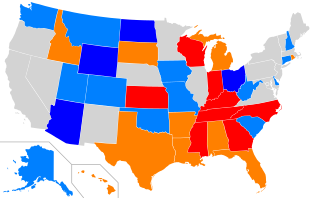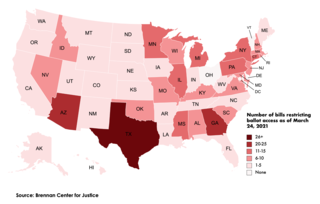Electoral fraud, sometimes referred to as election manipulation, voter fraud or vote rigging, involves illegal interference with the process of an election, either by increasing the vote share of a favored candidate, depressing the vote share of rival candidates, or both. It differs from but often goes hand-in-hand with voter suppression. What exactly constitutes electoral fraud varies from country to country.

The Help America Vote Act of 2002, or HAVA, is a United States federal law which passed in the House 357-48 and 92-2 in the Senate and was signed into law by President Bush on October 29, 2002. The bill was drafted in reaction to the controversy surrounding the 2000 U.S. presidential election, when almost two million ballots were disqualified because they registered multiple votes or no votes when run through vote-counting machines.
Voter caging involves challenging the registration status of voters and calling into question the legality of allowing them to vote. Usually it involves sending mail directly to registered voters and compiling a list from mail returned undelivered. Undeliverable mail is seen as proof that the person no longer resides at the address on their voter registration. The resultant list is then used by election officials to purge names from the voter registration rolls or to challenge voters' eligibility to vote on the grounds that the voters no longer reside at their registered addresses.

Voter suppression is a strategy used to influence the outcome of an election by discouraging or preventing specific groups of people from voting. It is distinguished from political campaigning in that campaigning attempts to change likely voting behavior by changing the opinions of potential voters through persuasion and organization, activating otherwise inactive voters, or registering new supporters. Voter suppression, instead, attempts to gain an advantage by reducing the turnout of certain voters. Suppression is an anti-democratic tactic associated with authoritarianism.
During the 2004 United States elections, concerns were raised about various aspects of the voting process, including whether voting had been made accessible to all those entitled to vote, whether ineligible voters were registered, whether voters were registered multiple times, and whether the votes cast had been correctly counted. More controversial was the charge that these issues might have affected the reported outcome of the presidential election, in which the incumbent, Republican President George W. Bush, defeated the Democratic challenger, Senator John Kerry. Despite the existing controversies, Kerry conceded the election the following day on November 3.
The National Ballot Security Task Force (BSTF) was a controversial group founded in 1981 in New Jersey, United States by the Republican National Committee (RNC) as a means of intimidating voters and discouraging voter turnout among likely Democratic voters in the gubernatorial election. The group's activities prompted the Democratic National Committee (DNC) to bring a federal lawsuit, alleging a violation of the Voting Rights Act, illegal harassment, and voter intimidation. The RNC and New Jersey Republican State Committee entered into a consent decree in 1982, barring them from engaging in further such conduct. The RNC unsuccessfully tried to lift the consent decree several times over the next 25 years; these attempts were rejected by the federal courts each time. However, in 2009, the US District Court of New Jersey agreed to several modifications of the consent decree, including the addition of an expiration date. That date was set for December 1, 2017. Democrats sought an extension of the consent decree based on allegations of new conduct, but the request was denied in January 2018 and the decree expired.

Kris William Kobach is an American lawyer and politician who is the Attorney General-elect of Kansas. He previously served as the 31st Secretary of State of Kansas. A former Chairman of the Kansas Republican Party, Kobach came to national prominence over his far-right anti-immigration views, including involvement in the implementation of high-profile anti-immigration ordinances in various American cities. Kobach is also known for his calls for stronger voter ID laws in the United States, reinstating the National Security Entry-Exit Registration System, and his advocacy for anti-abortion legislation. He has made claims about the extent of voter fraud in the United States that studies and fact-checkers have concluded are false or unsubstantiated.

Hans Anatol von Spakovsky is an American attorney and a former member of the Federal Election Commission (FEC). He is the manager of the Heritage Foundation's Election Law Reform Initiative and a senior legal fellow in Heritage's Meese Center for Legal and Judicial Studies. He is an advocate for more restrictive voting laws. He has been described as playing an influential role in making unfounded concern about voter fraud mainstream in the Republican Party. His work, which claims voting fraud is rampant, is controversial as it has been found to be fraught with misleading statistics.

Bradley Joseph Schlozman is an American attorney who served as acting head of the Civil Rights Division of the United States Department of Justice under Attorney General Alberto Gonzales. A member of the Republican Party, Schlozman was appointed by Gonzales as the interim U.S. Attorney for the Western District of Missouri, replacing Todd Graves, and he assumed that office on March 23, 2006. In April 2007, Schlozman left the U.S. Attorney position to work at the Executive Office for United States Attorneys.
Operation Eagle Eye was a Republican Party voter suppression operation in the 1960s in Arizona to challenge minority voters. In the United States only citizens have ever been able to vote, and in 1964 only literate citizens could vote, so it was legal to ensure that (1) a potential voter was literate, and (2) a potential voter was a United States Citizen. Through the employment of literacy tests, oral demands to interpret the United States Constitution and detailed questions about a potential voter's origins and how long the potential voter had been in the United States, Republican workers would challenge minority voters, especially those with broken English. William Rehnquist, later chief justice of the Supreme Court of the United States, is said to have been the head of a group of lawyers hoping to challenge voters in minority Democratic precincts. Operation Eagle Eye was a two-year effort, and the laws in Arizona have since made this kind of challenge illegal.
John Christian Adams is an American attorney and conservative activist formerly employed by the United States Department of Justice under the George W. Bush administration. Since leaving the DOJ, Adams has become notable for making alarmist and false claims about the extent of voter fraud in the United States. He has falsely accused a number of legitimate voters of being fraudulent, and has published information about them online, including Social Security numbers.

Voter ID laws in the United States are laws that require a person to provide some form of official identification before they are permitted to register to vote, receive a ballot for an election, or to actually vote in elections in the United States.
Shelby County v. Holder, 570 U.S. 529 (2013), was a landmark decision of the Supreme Court of the United States regarding the constitutionality of two provisions of the Voting Rights Act of 1965: Section 5, which requires certain states and local governments to obtain federal preclearance before implementing any changes to their voting laws or practices; and Section 4(b), which contains the coverage formula that determines which jurisdictions are subject to preclearance based on their histories of discrimination in voting.

Voter suppression in the United States is various legal and illegal efforts to prevent eligible voters from exercising their right to vote. Where found, such voter suppression efforts vary by state, local government, precinct, and election. Voter suppression has historically been used for racial, economic, gender, age and disability discrimination. Before and during the American Civil War, most African-Americans had not been able to vote. After the Civil War, all African-Americans were granted voting rights, causing some Southern Democrats and former Confederate states to institute actions such as poll taxes or language tests that were ostensibly not in contradiction to the U.S. Constitution at the time, but were used to limit and suppress voting access, most notably African American communities that made up large proportions of the population in those areas, but in many regions the majority of the electorate as a whole was functionally or officially unable to register to vote or unable to cast a ballot. African Americans' access to registration and voting in the South was often difficult until the Civil Rights Act of 1964, and continues to be a subject of debate.
Voter impersonation, also sometimes called in-person voter fraud, is a form of electoral fraud in which a person who is eligible to vote in an election votes more than once, or a person who is not eligible to vote does so by voting under the name of an eligible voter. In the United States, voter ID laws have been enacted in a number of states by Republican legislatures and governors since 2010 with the purported aim of preventing voter impersonation. Existing research and evidence shows that voter impersonation is extremely rare. Between 2000 and 2014, there were only 31 documented instances of voter impersonation. There is no evidence that it has changed the result of any election. In April 2020, a voter fraud study covering 20 years by the Massachusetts Institute of Technology found the level of mail-in ballot fraud "exceedingly rare" since it occurs only in "0.00006 percent" of individual votes nationally, and, in one state, "0.000004 percent — about five times less likely than getting hit by lightning in the United States."

The 2016 Arizona Republican presidential primary took place on March 22 in the U.S. state of Arizona as one of the Republican Party's primaries ahead of the 2016 presidential election. Despite a late challenge by Texas Senator Ted Cruz, Donald Trump won the primary and netted all 58 delegates in the winner-take-all contest. On the same day were held Democratic and Green primaries in Arizona, as well as Republican and Democratic caucuses in Utah and Idaho Democratic caucus, so the day was dubbed "Western Tuesday" by media.

John Robert "Jay" Ashcroft is an American attorney, engineer and politician serving as the 40th and current Secretary of State of Missouri since 2017. A member of the Republican Party, he is the son of former U.S. Attorney General John Ashcroft.

The Presidential Advisory Commission on Election Integrity, also called the Voter Fraud Commission, was a Presidential Commission established by Donald Trump that ran from May 11, 2017 to January 3, 2018. The Trump administration said the commission would review claims of voter fraud, improper registration, and voter suppression. The establishment of the commission followed Trump's false claim that millions of illegal immigrants had voted in the 2016 presidential election, costing him the popular vote. Vice President Mike Pence was chosen as chair of the commission and Kansas Secretary of State Kris Kobach was its vice chair and day-to-day administrator.

Following the 2020 United States presidential election and the unsuccessful attempts by Donald Trump and various other Republican officials to overturn it, Republican lawmakers initiated a sweeping effort to make voting laws more restrictive within several states across the country. According to the Brennan Center for Justice, as of October 4, 2021, more than 425 bills that would restrict voting access have been introduced in 49 states—with 33 of these bills enacted across 19 states so far. The bills are largely centered around limiting mail-in voting, strengthening voter ID laws, shortening early voting, eliminating automatic and same-day voter registration, curbing the use of ballot drop boxes, and allowing for increased purging of voter rolls. Republicans in at least eight states have also introduced bills that would give lawmakers greater power over election administration after they were unsuccessful in their attempts to overturn election results in swing states won by Democratic candidate Joe Biden in the 2020 election.











